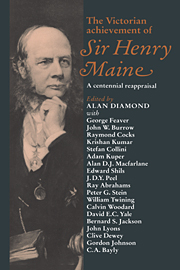Book contents
- Frontmatter
- Contents
- Notes on contributors
- Foreword by Sir John Lyons
- Introduction
- 1 The Victorian values of Sir Henry Maine
- PART 1 MAINE AND THE IDEA OF PROGRESS
- PART 2 MAINE AND THE SOCIAL SCIENCES
- PART 3 MAINE ON LAW, LEGAL CHANGE AND LEGAL EDUCATION
- PART 4 MAINE AND INDIA
- Appendix: the conference programme
- Bibliography
- Index
Introduction
Published online by Cambridge University Press: 04 September 2009
- Frontmatter
- Contents
- Notes on contributors
- Foreword by Sir John Lyons
- Introduction
- 1 The Victorian values of Sir Henry Maine
- PART 1 MAINE AND THE IDEA OF PROGRESS
- PART 2 MAINE AND THE SOCIAL SCIENCES
- PART 3 MAINE ON LAW, LEGAL CHANGE AND LEGAL EDUCATION
- PART 4 MAINE AND INDIA
- Appendix: the conference programme
- Bibliography
- Index
Summary
It might be said of Maine, as Sir Carleton Allen said of Maine's great antagonist Austin: ‘a student must feel that he reads Austin only in order to controvert him’ (1964: 7). Allen goes on to observe, however, that
For a systematic exposition of the methods of English jurisprudence, we still have to turn to Austin. Nobody has replaced him. Austinian jurisprudence… so far maintains its influence that it may still be described as the characteristic jurisprudence of England… (1964: 7)
Surveying the scene 100 years after his death, an unbiased observer would be hard pressed to say as much about the current reputation and influence of Sir Henry Sumner Maine. Those who read Maine may indeed feel that they do so ‘only in order to controvert him’, but how many in fact read him at all? Certainly, he seems all but forgotten today in those fields in which he hoped to exercise the greatest influence: jurisprudence and legal history. The very dominance – until recently, at least – of Austinian jurisprudence suggests that Maine's historical outlook has become peripheral to the concerns of legal philosophy. The battle for the soul of legal philosophy today is a battle between utilitarianism and natural law, both of which Maine criticized as ahistorical. Maine's own historical approach, like historical jurisprudence in general, has been largely discredited, or at least marginalized.
- Type
- Chapter
- Information
- The Victorian Achievement of Sir Henry MaineA Centennial Reappraisal, pp. 1 - 27Publisher: Cambridge University PressPrint publication year: 1991

